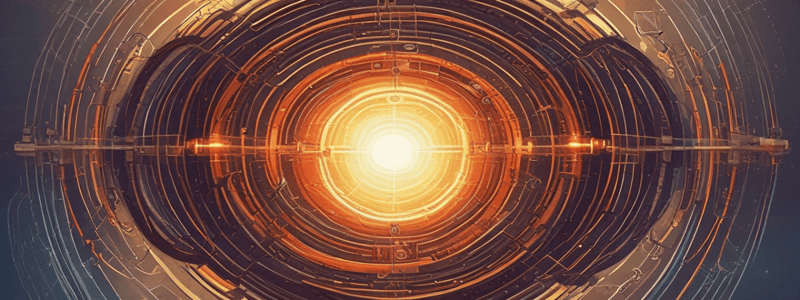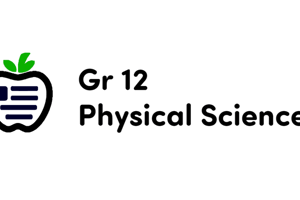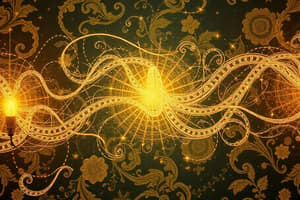Podcast
Questions and Answers
What is the unit of measurement for power in physics?
What is the unit of measurement for power in physics?
- Joules per second (J/s) (correct)
- Newtons times meters (N*m)
- Newtons times meters over seconds (N*m/s) (correct)
- Kilograms times meters squared over seconds squared (kg*m^2/s^2)
What is the conversion rate from horsepower to Watts?
What is the conversion rate from horsepower to Watts?
- 1 hp = 0.7355 W
- 1 hp = 1.5105 W (correct)
- 1 hp = 3.5105 W
- 1 hp = 2.4505 W
What is the formula to calculate power in the context of torque?
What is the formula to calculate power in the context of torque?
- P = Fds
- P = Frsinθ
- P = Fr
- P = Fdsinθ (correct)
What is the unit of measurement for angular velocity?
What is the unit of measurement for angular velocity?
What is the difference between instantaneous power and average power?
What is the difference between instantaneous power and average power?
What is the main difference between mechanical power and electrical power?
What is the main difference between mechanical power and electrical power?
What is the formula to calculate electrical power?
What is the formula to calculate electrical power?
What is the unit of measurement for current?
What is the unit of measurement for current?
What is the purpose of a power rating?
What is the purpose of a power rating?
What can happen if an object has a lower power rating than the outlet it is plugged into?
What can happen if an object has a lower power rating than the outlet it is plugged into?
What is the correct definition of power in physics?
What is the correct definition of power in physics?
What unit is power measured in?
What unit is power measured in?
How is power related to a bicycle compared to a motorcycle in terms of energy?
How is power related to a bicycle compared to a motorcycle in terms of energy?
Which of the following statements about the wattage of lightbulbs is true?
Which of the following statements about the wattage of lightbulbs is true?
What historical figure is the unit of power named after?
What historical figure is the unit of power named after?
What is the equivalent of 1 horsepower in watts?
What is the equivalent of 1 horsepower in watts?
Which of the following scenarios describes the concept of power?
Which of the following scenarios describes the concept of power?
Which formula correctly relates power to work and time?
Which formula correctly relates power to work and time?
What is a common misconception about power in physics?
What is a common misconception about power in physics?
What happens to the distance an object can move with an increase in power?
What happens to the distance an object can move with an increase in power?
Flashcards are hidden until you start studying
Study Notes
Power in Physics
- Power is defined as the amount of work completed or energy released per unit of time.
- Higher power results in more energy expended over time, enabling greater motion distance for objects.
Units of Power
- Power is measured in Watts (W), equivalent to Joules per second (J/s), named after engineer James Watt.
- 1 horsepower (hp) is approximately 750 W; this measurement is based on experiments involving force and distance.
Power Formula
- Power formula: ( P = \frac{W}{t} ) (work done over time).
- Power can also be expressed as force times distance (N*m/s).
Torque and Power
- Torque refers to the rotational force applied to move objects around a fixed point.
- Power related to torque can be calculated using the formula ( P = F \cdot d \cdot \sin(\theta) ).
Average vs Instantaneous Power
- Instantaneous power is the power at a specific moment. Average power is the energy output over a duration.
- Example comparison: energy output at ( t = 1 ) second versus total energy from ( t = 1 ) to ( t = 4 ) seconds.
Types of Power
- Mechanical power assesses work output, e.g., the energy from fuel to engine output.
- Electrical power measures energy movement in a circuit over time, defined using voltage (V) and current (I) as ( P = IV ).
Electrical Power Concepts
- Current (I) is measured in Coulombs per second or Amperes (A).
- Voltage (V) is expressed in Joules per Coulomb.
- Power rating indicates the maximum energy an electrical device can handle, risks of damage occur if exceeded.
Application of Power Formulas
- Example 1: Mechanical power output from an engine running at 1200 rpm with a torque of 120 Nm can be calculated.
- Example 2: Electrical power in a circuit can be calculated with a battery providing 12V and a current of 8 Amps.
Angular Velocity and Power
- Angular velocity (w) describes an object's rotation rate; power can be calculated using angular velocity and torque.
- For instance, with an engine at 250 rotations per second and torque of 250 Nm, power output equals 62.5 kW.
Real-World Implications
- Power efficiency affects everyday devices, with improper power ratings potentially causing malfunction or damage.
- Understanding both mechanical and electrical power helps in optimizing and safely utilizing various technologies.
Studying That Suits You
Use AI to generate personalized quizzes and flashcards to suit your learning preferences.




